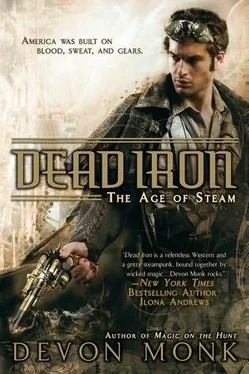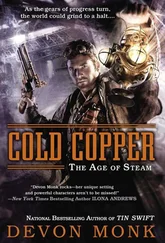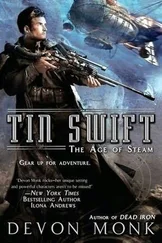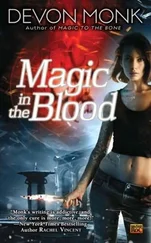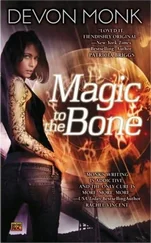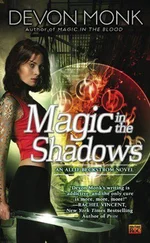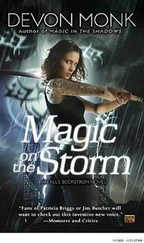He pulled a key from a chain in his waistcoat and unlocked the door. He threw the door open. There were no windows in this carriage. There was just the one door. No other cracks for anything large or small to enter or exit.
Shard LeFel stepped into the room and Mr. Shunt scuttled in, latching the door tight behind him and throwing the room into complete darkness.
“Light, Mr. Shunt,” LeFel barked.
Mr. Shunt snapped his fingers, steel scraping flint, and caught fire to an oil-drenched wick of a lantern he plucked from the wall.
Mr. Shunt held that lantern high, the golden light washing over the room like a silken veil.
The room was spartan, shockingly so when compared with the other two carriages. Walls were lined with worktables, benches, drawers, crates, and shelves of iron and wood. Tools glittered, hung above the workbenches, tools that could pry, vise, weld, rivet. No curved edges, no rich trappings, no comforts here. This room was a place of extrapolation, of bending metal to the fevered dreams of the mind. A place of devising in a way most uncommon.
In each of three corners of the room stood a creature of bolt and gear and bone. Similar to Mr. Shunt, the creatures wore long woolen coats, layers of gray lace, tatters, and high collars and hats that covered their faces. They seemed nothing more than beggars hung to rot, but they were more. Much more.
They were Strange come into the Strangework bodies Shard LeFel and Mr. Shunt had devised for them. Fueled by blood and glim, they did not move, did not breathe, did not make a sound as LeFel and Mr. Shunt moved about the room. They were still as death itself. Only their eyes betrayed their true state, burning through the darkness and following LeFel’s and Mr. Shunt’s every move.
The Strangework had sworn to stand guard to the one precious thing in the room.
In the exact center of the floor was a platform. And upon that platform lay a closed black door the size of a coffin. That door did not lead to the ground outside the train car. That door, when pried by a blood key and moonlight, would take him home, and remain open, a hidden opening to this world, rolling on the dead iron tracks across the land.
LeFel strode to the wall and hooked the crook of his cane into one of the lower cupboard doors, pulling it open. Just enough lamplight fell upon the contents to make out the shape. A wooden coffin. No larger than a small child. Just the size that would fit the blacksmith’s boy within.
LeFel rested his cane against the open cupboard door and drew the coffin out with both hands. He carried it a short ways to a worktable and placed it on top.
Mr. Shunt craned his long neck to better see over LeFel’s shoulder. Even the Strangework guards in the corners stirred in anticipation.
LeFel thumbed the latches and pushed open the lid.
Inside the coffin was a swaddled form, the size of a small child. LeFel removed the swaddling cloth away from the figure. Within the blanket was a gnarled, twisted piece of wood. The bark was papery as madrone, showing just peeks of pale wood beneath the peeling exterior. Three bones, perhaps each a joint of a human pinkie, were placed upon the wood, and all around it were gears, springs, levers, and wheels.
Once the blanket had been removed, LeFel spoke. “This, I will leave to you, Mr. Shunt. Prove to me again your worth.”
Mr. Shunt drifted forward to stand next to LeFel. “The pleasure will be mine.” He extended one long arm, spindly fingers wrapping around the chunk of wood.
LeFel smiled while Mr. Shunt worked a matter of devising he’d seen only the Strange attempt. By and by under Mr. Shunt’s quick fingers, the bark shed away from the heart of the wood. Leaving behind something soft, something malleable.
It took no time for Mr. Shunt to carve the wood into the likeness he wanted. Eyes, nose, mouth, curve of cheek, and hollow of neck. Arms, body, legs. It was fine work and LeFel savored the mastery of each slice, gouge, and cut.
Then when the carving was done, when it was clear even in the watery lamplight that a child lay within that coffin, Mr. Shunt dug in his pockets, and leaned forward to open several small drawers, withdrawing more gears, springs, and bolts, more bone, tendon, and bits of flesh floating in liquid-filled jars.
These he plied to the wood, hooking with steel, sewing with copper threads, running pulleys of sinew for joints, and bits of bone hammered in place like nails. For the Strange to walk this land heavy enough to leave footprints behind, they needed more than a doorway. They needed gears, blood, and flesh. Strangework.
“Blood?” LeFel asked as he watched Mr. Shunt’s devising.
Mr. Shunt turned his head to stare at LeFel, eyes wide and red. “Yours, perhaps?” he whispered.
LeFel scowled at Mr. Shunt’s naked desire. “You forget yourself, Strange,” he said. “My blood is not in our contract.”
“Yes, lord,” Mr. Shunt said. “Of course, lord.” He bowed, but his eyes did not lower. “What blood pleases you?”
“The dreamer’s will do.” He withdrew the small vial of the boy’s blood he had taken earlier.
Mr. Shunt smiled, his teeth a ragged line of ivory blades. He took the vial, twisted the cork free with his teeth, and dripped the blood over the gears and flesh and heart of the wooden child, liquid splattering like a dark stain.
Then Mr. Shunt pulled a tiny vial of glim from his cuff pocket. The glim glowed like a green star upon his palm. This, he placed delicately into the slit in the child’s chest, resting it carefully among copper wires and springs. He unstitched a thread from his own face, and sewed the glim up tight. He spoke a litany of words, old words, snake soft, clucking and catching in rhythm as each stitch joined flesh and fiber and cog.
When Mr. Shunt was done, he bit the string in two, setting the glim-fed gears into motion.
At the snap of thread, the creature in the coffin shuddered, then opened its eyes.
The Strangework in the corners of the room inhaled, and that smallest movement shifted the tubes that bound them at ankles and wrists to the doorway itself.
The stock, the changeling, the Strange, looked exactly like the blacksmith’s boy, looked just like the little dreamer. Except when it smiled. Then its eyes were as old as the gravewood and flesh of which it was made.
LeFel picked up his cane. “To catch the witch, we must catch her heart.” He considered the changeling with a critical eye. “The boy should show some hardships, wandering for days in the wilds; don’t you agree, Mr. Shunt?”
“Indeed,” Mr. Shunt breathed. He dragged thumbs across the boy’s cheek, leaving behind a bruising welt.
The Strangework laughed. “More,” it said.
Mr. Shunt tugged at its hair, nicked its ear, tore the shirt it appeared to be wearing—a shirt that looked exactly like the shirt the blacksmith’s boy wore. The more Mr. Shunt nipped and scraped, cut and clipped, the more the changeling laughed.
“Enough,” LeFel finally said. Then, to the boy, “You will lure the witch from her home.”
The changeling nodded, somber as an undertaker.
“Bring the witch to where Mr. Shunt waits for her.”
The changeling nodded again, then hopped out of the coffin, landing spryly on his feet.
That was no child standing in the middle of the floor. Even though it was the perfect image of the boy, from tousled hair to scuffed feet.
“See that she thinks you the lost child. Weep for her, laugh for her. Fear for her,” LeFel said. “And do not fail me.”
LeFel turned to Mr. Shunt. “You will take the dog with you to catch up the witch. I will not have this night end without the witch at my feet.”
Mr. Shunt bowed again and clicked his tongue. The changeling skipped up beside him. Mr. Shunt glided toward the door, the changeling at his heels, tearing holes in its shirtsleeves, pinching its own arms while it hummed a soft song to itself.
Читать дальше
